37% of U.S. adults think we are losing the war in Afghanistan
When Donald Trump was inaugurated five months ago, he became not just the President, but Commander-in-Chief of the U.S Armed Forces. But it’s not clear Americans see him as a good Commander-in-Chief: for the most part they are content with his decision to delegate decisions about troop strength in Afghanistan to others. In the latest Economist/YouGov Poll, Americans would much rather have decisions about troop strength in Afghanistan made by the Secretary of Defense or by generals on the ground than by President Trump himself.
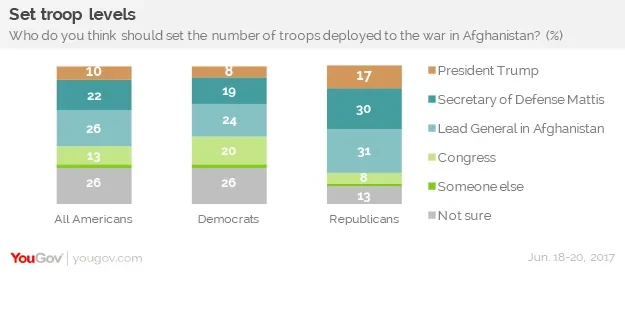
This is not a partisan judgment. Republicans as well as Democrats generally agree that troop decision should be made by the Secretary of Defense or the general in charge -- in other words someone other than the President. Democrats are more willing than Republicans to delegate the decision to Congress.
Whoever makes a decision about the war in Afghanistan is making a decision about a war that Americans are even less likely than they were two years ago to think has gone well. Only 26% now say Afghan civilians are better off today than they were when the war began- a drop of ten points from June 2014- when former President Barack Obama announced U.S. troop withdrawals from Afghanistan.
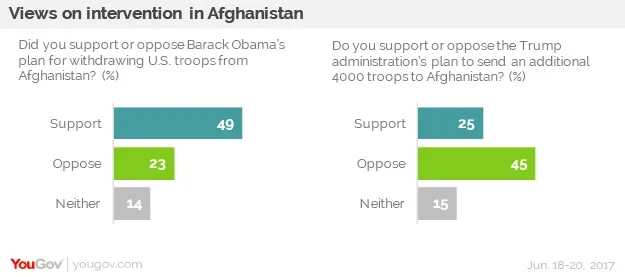
Looking back, Americans still support that 2014 withdrawal, though not by the nearly four to one margin they did two years ago. Now the margin in opposition is just over two to one. But the public opposes the current Administration’s plan to send 4,000 more troops there.
Perhaps any decision about U.S. troops in Afghanistan – except for a decision to withdraw them once and for all – would be met with opposition. By a narrow five point margin, Americans say it was a mistake to send troops to fight in Afghanistan in the first place. By more than two to one, Americans say the U.S. is losing, not winning the war there, though half the public isn’t sure how to judge the conflict.
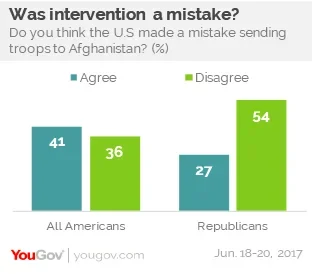
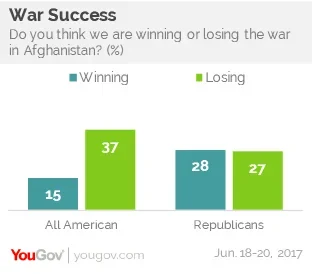
Republicans don’t think the original decision to send troops was a mistake, and comparably more of them see the U.S. as winning the war. But just as many Republicans think the U.S. is losing as say it is winning.
Many Americans say the President is not handling foreign policy in general well. Just 36% approve, and 45% disapprove of how Donald Trump is handling foreign policy. In only two other issue areas is the disapproval rating higher: 48% disapprove of the President’s handling of the environment; 51% disapprove of his handling of health care.
This President, like two of the last three Presidents, never served in the military himself. But that isn’t a reason for the public to want other people to make decisions about troop strength. By three to one, Americans agree that a president who did not serve in the military can be an effective commander-in-chief.
However, Donald Trump gets little benefit from this. There are more personal reasons that many don’t trust him on this question. A majority say they are not confident in President Trump’s ability to be an effective commander-in-chief. On a second question, only one in three think he is “ready” to be Commander-in-Chief.
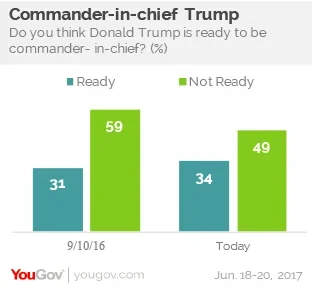
There has been little change since the fall in the proportion giving the President a positive assessment about his capability to make military judgments, though fewer say he is not ready now (more are not sure). During the campaign, Hillary Clinton, the Democratic nominee, consistently outscored Donald Trump on this measure. Like Trump, she too did not serve in the military.
While Democrats are clearly skeptical about the President’s ability to serve as Commander-in-Chief, they also reject his decision to hand over the decisions about troop strength in Afghanistan to the Secretary of Defense. Republicans approve the decision, Democrats do not.
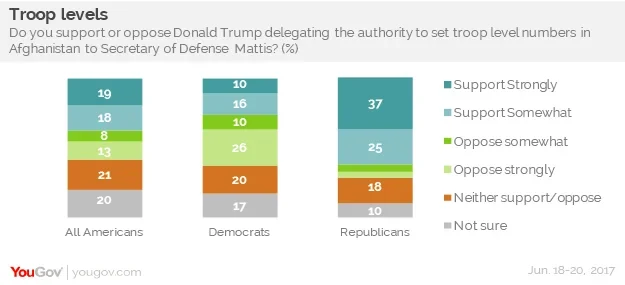
This sort of partisan divide has seen little change since the start of the Trump Administration, with Democrats consistently opposing most of what the President has done while Republicans stand beside President Trump. On this question, Democrats may not be making a statement about the decision itself, but about the person making it. Only 14% of Democrats approve of the President’s overall job performance; only 13% view him favorably. More than eight in ten Democrats hold an unfavorable view of the Republican President.








